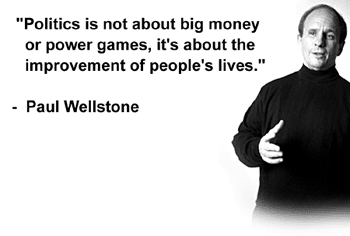
We may not all be able to agree on what winning would look like in global politics and one thing is certain, you are going to get a different answer about what winning is from everyone you meet. To me, winning on a global level is quite simply a peaceful world. While some would argue that this is not only an unrealistic goal but it also fails to address the actual issue of winning, I would argue that it’s the perfect version of winning because when one’s nation is not at war it allows for the prosperity of other components of their nation.
By creating a peaceful globe, all nations would win because it would allow for the reallocation of resources to benefit different aspects of nation. Think for a moment, the total cost of America’s current wars with Iraq and Afghanistan. The running total of those two wars comes to just over $1,000,000,000,000 and is continuing to grow with every passing second. If the United States had remained out of those conflicts, those $1,000,000,000,000 could have gone to education, job creation, health care, infrastructure, welfare and/or numerous other things. If those $1,000,000,000,000 had gone only to education think of how many children could attend college, think of how many more educated people would be contributing to this world. While this is not truly why I believe we should do this, think of all of those educated people that would then add to our GDP, higher levels of education lead to higher earnings, which leads to more consumption allowing our economy to grow. Or think if we put even half of that money into green technology. We would no longer need to talk about oil like it were a drug we need to wean ourselves of off, green technologies would have abolished that kind of talk. Again, while this isn’t why I think winning through peace is important, think of how much stronger of a competitor the United States could be against other economic powers if we had invested that money wisely either in ourselves or in other means. Another added bonus of avoiding conflict is the added stability to a nation, thus allowing for a nation to grow and prosper.
The short and long of it for me is that, in the words of one Paul Wellstone, “We all do better when we all do better.” If the globe is at peace, more nations will have more money to redirect into other, more advantageous avenues like education, green technology, health care or many others. Winning doesn’t have to mean global domination; it can be the idea of a peaceful world and the added benefits that ensue from that.
Sarah, your argument that true winning in world politics is living within a peaceful world is nothing short of inspirational. I have definitely thought several times about the increasing number of dollars daily America continues to spend on wars each day. It brings up the questions is war justifiable? I wrote a paper on this topic in high school and your blog reminded me of how I debated over and over again what I would exactly say in this paper I wrote. What is your opinion? With your perception of winning being a peaceful world are their any circumstances when you think war is justifiable?
ReplyDeleteJust food for thought. Looking forward to your reply.
This comment has been removed by the author.
ReplyDeleteFirst, thank you for your kind words! While I am a strong advocate for peace and pacifism, I refuse to be ignorant to the fact that at times, wars are justifiable and necessary, as much as it kills me to say that. For example, I think that a justifiable war would be one that has a specific purpose and that abides by international law. An example of this would be the first Gulf war. Saddam invaded Kuwait, breaking international law, Bush Sr. noticed, as did the rest of the world, approached the U.N. about having troops go into Kuwait and push Saddam back to the boarder between Iraq and Kuwait and then upon achieving this goal, stopped and left. While it is arguable that this war was mostly about oil and less about doing the right thing, Bush Sr. approached the issue in the right way and had legitimate grounds to engage in war due to the fact that Saddam, by invading Kuwait, broke internationally recognized law. While there were aspects of this war that I do not support or feel were right, I cannot deny that Bush Sr. went to war in an acceptable way. Another reason why I can understand this type of military engagement is because of how Bush Sr. went about doing it. Unlike his son, George W., Bush Sr. got the United Nations seal of approval before going to war. He assembled an international force using the United Nations as the pool from which to draw from, in total over thirty different countries were involved in the fighting.
ReplyDeleteI also feel that war is justifiable when it is in defense of those who are victims of human rights abuses. According to the General Assembly Resolution 260 of the United Nations, the global community is responsible to intervene when acts of genocide are occurring, have been attempted or there is conspiracy to commit genocide. After the atrocities committed by the Nazi regime, the global community promised that genocide would never again occur without global opposition. The global community has failed on this account many times (Yugoslavia, Rwanda, Sudan, Congo and many more). However, I feel that military intervention to stop genocide is completely justifiable.
Clearly, in a perfect world, there would be no war. But as the world stands, we are not yet to a place where we can all be at peace. And while it breaks my heart to call any war justifiable, there are those that fall into that category.
_______________________________________________
http://www.hrweb.org/legal/genocide.html